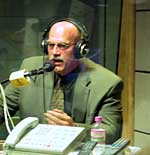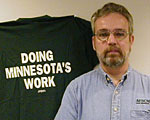Unions insist state has money for a better offer
By Michael Khoo
Minnesota Public Radio
October 9, 2001 State officials and leaders of the two largest public employee unions are set to resume contract talks on Thursday, but Gov. Jesse Ventura says he doesn't see any way to satisfy the demands of striking workers short of cutting government payrolls. Union leaders, however, say if more money isn't available, there's little chance for movement when talks resume.
| |
|
|
|
||
"We could very well be facing quite substantial budget shortfalls. That's a distinct possibility. And in the case of if I do deal with that, why, I will cut down the size and scope of government. So the very people who are striking, some of the people standing next to them may not have jobs," Ventura said.
But union leaders dispute that analysis. They say individual state agencies routinely run up surpluses as a result of unexpected efficiencies or unfilled staff positions.
Peter Benner, the executive director of the American Federation of State, County, and Municipal Employees Council 6, says the state already has some money in the bank and suggests more will accumulate more over the next two years. Benner says the governor's fiscal prudence was lacking when he pushed for record property tax relief earlier this year.
"So for certain circumstances, the governor is willing to, in a sense, spend money he may not have. And we think the state employees should at least have some access to that same rationale," Benner said.
| |
|
|
|
||
Ventura did, however, set aside a special reserve fund to protect the state in the event of an economic downturn. And he says the tax relief passed over the last three years should be considered a pay raise for all Minnesotans. "Why should only certain people get these pay raises? In other words, I should deny income tax relief to Minnesota as a whole and give it to one particular group? Or I should deny license tab reductions and give that money to one specific group?" Ventura said.
Callers to the show were split in their support for the governor. Some, like George, a truck driver, asked Ventura to stand firm. "I don't feel like paying any more taxes so the guy that works for the state next door can live a better life than me and my kids when I'm just barely making it by myself," he said.
But Carlotta, an epidemiologist for the state Health Department and a member of the Minnesota Association of Professional Employees, questioned the big tax cuts. She said the threat of further terrorist attacks should prompt the administration to settle with state workers. She says the impasse has left Minnesota ill-prepared to deal with health threats such as the current anthrax case in Florida.
"If something like that happened here right now and we chose not to cross the picket line, I think the health department would have a real hard time dealing with that," she said.
"I can't do those studies. That would be, to me, that falls on your shoulders," Ventura responded.
Ventura has said the terrorist attacks and U.S. retaliation should put pressure on union members to "bite the bullet" and return to work.
MAPE President Deb Schadegg says public employees shouldn't bear the rigors of war alone. "I'm not sure if what the governor is saying is that landlords aren't going to be able to raise rents, and gas prices can't go up, and movies and a pound of butter can't go up because we're at war. If that's what he's saying, then he is going to have to sit across from me and explain that. I don't believe that's what he's saying. I think what I'm hearing is certain people need to suck it up," Schadegg said.
A spokesman for the governor says there are no plans to boost the state's wage and benefit offers when talks resume Thursday. And both unions say if that's the case, there's little likelihood of ending the strike this week.


